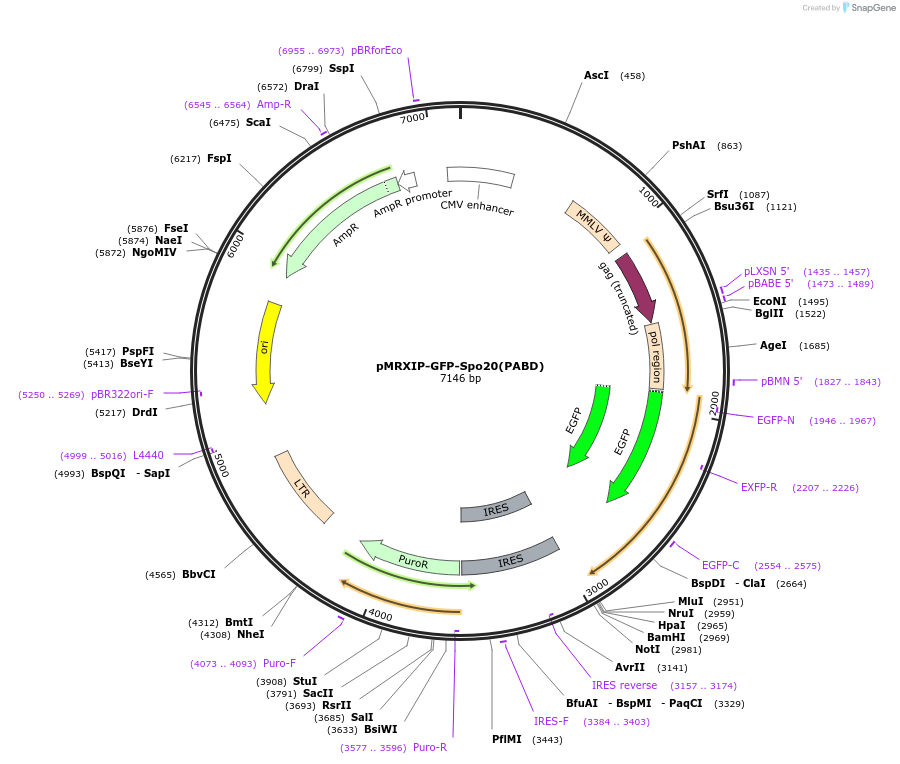pMRXIP-GFP-Spo20(PABD)
(Plasmid
#221758)
-
PurposeStable expression of GFP-Spo20(PABD) in mammalian cells
-
Depositing Lab
-
Sequence Information
Ordering
| Item | Catalog # | Description | Quantity | Price (USD) | |
|---|---|---|---|---|---|
| Plasmid | 221758 | Standard format: Plasmid sent in bacteria as agar stab | 1 | $89 | |
Backbone
-
Vector backbonepMRX-IP
-
Backbone manufacturerDr.Shoji Yamaoka of Tokyo Medical and Dental University
- Backbone size w/o insert (bp) 6137
- Total vector size (bp) 7886
-
Vector typeMammalian Expression, Retroviral
-
Selectable markersPuromycin
Growth in Bacteria
-
Bacterial Resistance(s)Ampicillin, 100 μg/mL
-
Growth Temperature37°C
-
Growth Strain(s)NEB Stable
-
Growth instructions100 μg/mL
-
Copy numberHigh Copy
Gene/Insert
-
Gene/Insert nameSpo20
-
Alt name2×Spo20(PABD)
-
Alt nameSOS1
-
SpeciesH. sapiens (human)
-
Insert Size (bp)261
-
Mutationtandem Spo20(PABD) (amino acids 422-551)
-
GenBank IDNM_005633
-
Entrez GeneSOS1 (a.k.a. GF1, GGF1, GINGF, HGF, NS4, SOS-1)
-
Tag
/ Fusion Protein
- GFP (N terminal on insert)
Cloning Information
- Cloning method Gibson Cloning
- 5′ sequencing primer TCTATCGATGAATTGGAATTCATGGACAATTGTTCAGGAAGC
- 3′ sequencing primer AACTCGCGAACGCGTGAATTCtcaACTAGTCTTAGTGGCGTC
- (Common Sequencing Primers)
Resource Information
-
Supplemental Documents
Terms and Licenses
-
Academic/Nonprofit Terms
-
Industry Terms
- Not Available to Industry
Trademarks:
- Zeocin® is an InvivoGen trademark.
These plasmids were created by your colleagues. Please acknowledge the Principal Investigator, cite the article in which the plasmids were described, and include Addgene in the Materials and Methods of your future publications.
-
For your Materials & Methods section:
pMRXIP-GFP-Spo20(PABD) was a gift from Noboru Mizushima (Addgene plasmid # 221758 ; http://n2t.net/addgene:221758 ; RRID:Addgene_221758) -
For your References section:
Syntaxin 17 recruitment to mature autophagosomes is temporally regulated by PI4P accumulation. Shinoda S, Sakai Y, Matsui T, Uematsu M, Koyama-Honda I, Sakamaki JI, Yamamoto H, Mizushima N. Elife. 2024 Jun 4;12:RP92189. doi: 10.7554/eLife.92189. 10.7554/eLife.92189 PubMed 38831696



